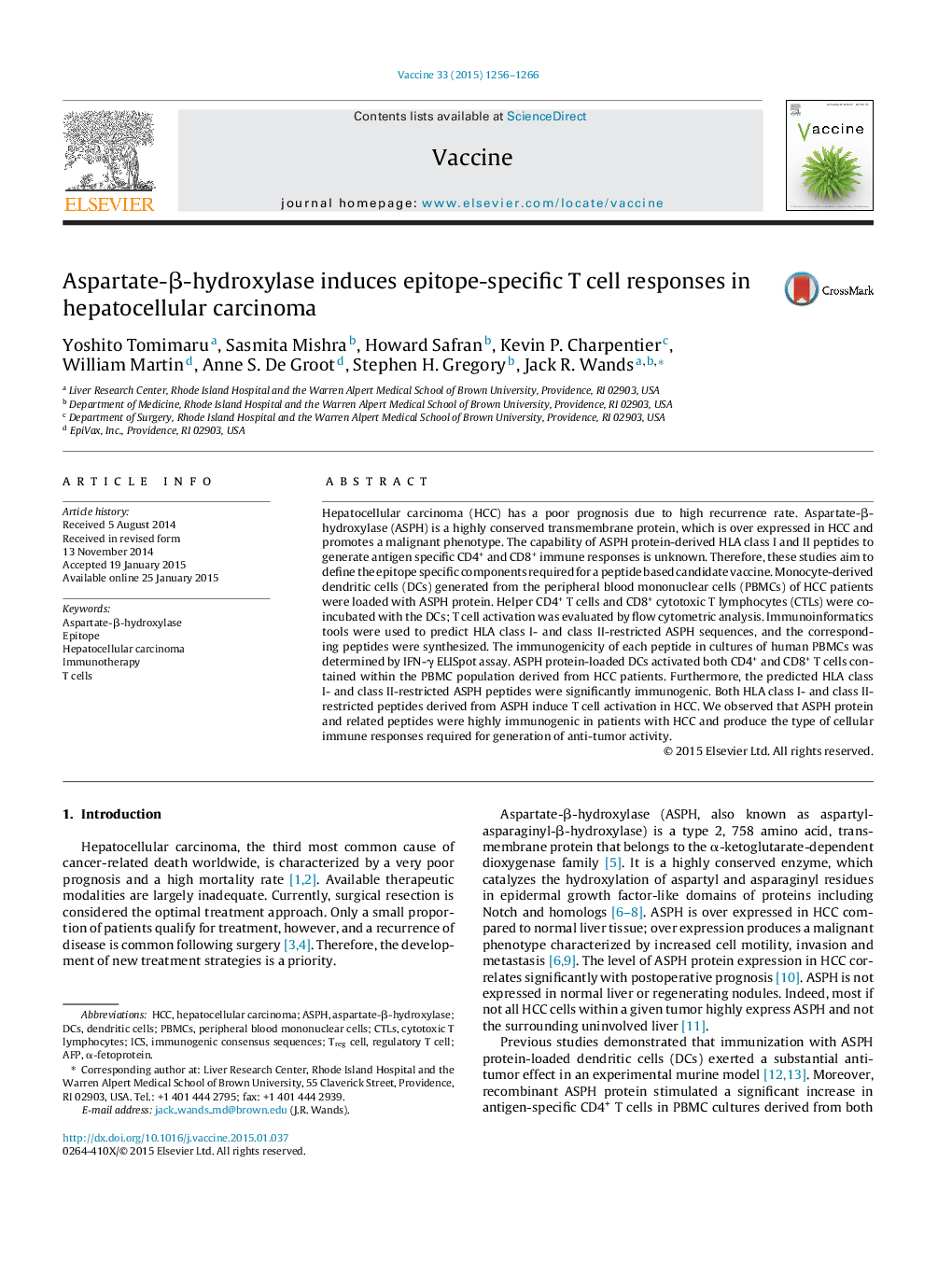| کد مقاله | کد نشریه | سال انتشار | مقاله انگلیسی | نسخه تمام متن |
|---|---|---|---|---|
| 10964030 | 1102700 | 2015 | 11 صفحه PDF | دانلود رایگان |
عنوان انگلیسی مقاله ISI
Aspartate-β-hydroxylase induces epitope-specific T cell responses in hepatocellular carcinoma
دانلود مقاله + سفارش ترجمه
دانلود مقاله ISI انگلیسی
رایگان برای ایرانیان
کلمات کلیدی
ASPHPBMCsDCsICSCTLs - CTL هاHCC - HCCα-fetoprotein - α-فتو پروتئینEpitope - اپیتوپimmunotherapy - ایمونوتراپیAFP - تست AFP یا آلفا فیتو پروتئینRegulatory T cell - سلول T تنظیم کنندهTreg cell - سلول Tregperipheral blood mononuclear cells - سلول های تک هسته ای خون محیطیT cells - سلول های تیDendritic cells - سلول های دندریتیکCytotoxic T lymphocytes - لنفوسیت های T سیتوتوکسیکHepatocellular carcinoma - کارسینوم هپاتوسلولار(کارسینوم سلولهای استخوانی)
موضوعات مرتبط
علوم زیستی و بیوفناوری
ایمنی شناسی و میکروب شناسی
ایمونولوژی
پیش نمایش صفحه اول مقاله

چکیده انگلیسی
Hepatocellular carcinoma (HCC) has a poor prognosis due to high recurrence rate. Aspartate-β-hydroxylase (ASPH) is a highly conserved transmembrane protein, which is over expressed in HCC and promotes a malignant phenotype. The capability of ASPH protein-derived HLA class I and II peptides to generate antigen specific CD4+ and CD8+ immune responses is unknown. Therefore, these studies aim to define the epitope specific components required for a peptide based candidate vaccine. Monocyte-derived dendritic cells (DCs) generated from the peripheral blood mononuclear cells (PBMCs) of HCC patients were loaded with ASPH protein. Helper CD4+ T cells and CD8+ cytotoxic T lymphocytes (CTLs) were co-incubated with the DCs; T cell activation was evaluated by flow cytometric analysis. Immunoinformatics tools were used to predict HLA class I- and class II-restricted ASPH sequences, and the corresponding peptides were synthesized. The immunogenicity of each peptide in cultures of human PBMCs was determined by IFN-γ ELISpot assay. ASPH protein-loaded DCs activated both CD4+ and CD8+ T cells contained within the PBMC population derived from HCC patients. Furthermore, the predicted HLA class I- and class II-restricted ASPH peptides were significantly immunogenic. Both HLA class I- and class II-restricted peptides derived from ASPH induce T cell activation in HCC. We observed that ASPH protein and related peptides were highly immunogenic in patients with HCC and produce the type of cellular immune responses required for generation of anti-tumor activity.
ناشر
Database: Elsevier - ScienceDirect (ساینس دایرکت)
Journal: Vaccine - Volume 33, Issue 10, 3 March 2015, Pages 1256-1266
Journal: Vaccine - Volume 33, Issue 10, 3 March 2015, Pages 1256-1266
نویسندگان
Yoshito Tomimaru, Sasmita Mishra, Howard Safran, Kevin P. Charpentier, William Martin, Anne S. De Groot, Stephen H. Gregory, Jack R. Wands,